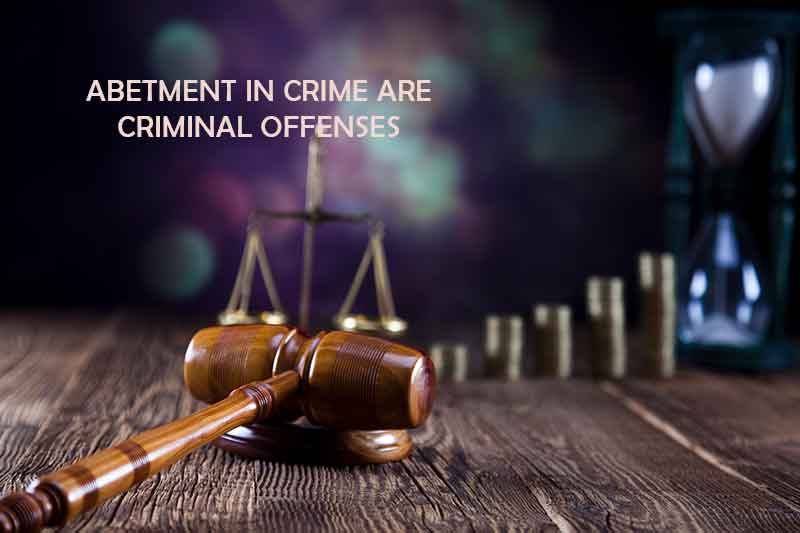The United Arab Emirates maintains a steadfast position on holding individuals accountable for criminal acts, encompassing not only the direct perpetrators but also those who aid or abet in the commission of unlawful activities. The concept of aiding and abetting entails the intentional facilitation, encouragement, or assistance in the planning or execution of a criminal offense. This legal principle ascribes culpability to individuals for their conscious involvement, even if they did not directly perpetrate the crime themselves. Within the UAE’s legal framework, aiding and abetting can result in severe penalties, often commensurate with the punishments prescribed for the principal offense.
Garnering a comprehensive understanding of the ramifications associated with this principle is of paramount importance for residents and visitors alike, as inadvertent actions or omissions can potentially implicate them in criminal proceedings, necessitating a thorough grasp of the relevant legal provisions.
What Constitutes Aiding and Abetting a Crime under UAE Law?
The United Arab Emirates’ current Penal Code, Federal Decree-Law No. 31 of 2021 [On the Issuance of the Crimes and Penalties Law], provides the legal definition of what constitutes aiding and abetting a crime. According to Articles 45 and 46 of this law, a person is considered an accomplice if they intentionally and knowingly assist or facilitate the commission of a criminal act.
Intention and knowledge of the crime are crucial factors in determining accomplice liability under UAE law. Mere presence at the scene of a crime, without active participation or intent to aid the perpetrator, does not automatically constitute aiding and abetting. The extent of an accomplice’s involvement dictates the severity of the penalty they face. Article 46 states that an accomplice may receive the same penalty as the perpetrator or a lesser punishment, depending on the specific circumstances and their level of participation in the criminal act.
Some examples of actions that could constitute aiding and abetting under UAE law include providing weapons, tools or other means to commit the crime, encouraging or instigating the perpetrator, assisting in the planning or execution stages, or helping the perpetrator evade justice after the fact.
It is important to note that the legal interpretations and applications are ultimately at the discretion of UAE judicial authorities on a case-by-case basis.
Elements of Abetment
Ho an'ny hetsika iray mahafeno fepetra ho fikomiana, dia tokony hofenoina singa roa lehibe:
- Actus Reus (Lalàna Meloka): Izany dia manondro ny hetsika manokana amin'ny fandrisihana, ny fandraisana anjara amin'ny tsikombakomba, na ny fanampiana fanahy iniana. Actus reus dia singa ara-batana amin'ny heloka bevava, toy ny hetsika famporisihana olona handroba na fanomezana azy ireo fitaovana hanaovana izany.
- Mens Rea (Ny saina meloka): Ny mpikomy dia tsy maintsy manana fikasana hanentana, hanampy, na hanamora ny fanaovana heloka bevava. Mens rea dia manondro ny singa ara-tsaina amin'ny heloka bevava, toy ny fikasana hanampy olona hanao heloka bevava.
Fanampin'izany, amin'ny ankapobeny dia tsy misy fepetra takiana amin'ny fanatanterahana ny heloka vita amin'ny fikomiana amin'ny fomba mahomby ho tompon'andraikitra amin'ny lalànan'ny fikomiana. Ny fikomiana dia azo enjehina noho ny fikasany sy ny fihetsiny hampiroboroboana ny heloka bevava, na dia tsy vita mihitsy aza ny heloka bevava.
Karazana na Endriky ny Abetment
Misy fomba telo voalohany ny heloka bevava mety hitranga ny fanararaotana:
1. Famporisihana
Voafaritra ho mivantana na ankolaka mampirisika, mihantsy, mampahery, na fangatahana olon-kafa hanao heloka bevava. Mety hitranga amin'ny alalan'ny teny, fihetsika, na fomba fampitana hafa izany. Mila fandraisana anjara mavitrika sy finiavana hanao heloka bevava ny famporisihana. Ohatra, raha misy olona milaza imbetsaka ny namany mba handroba banky ary manome drafitra amin'ny antsipiriany momba ny fomba hanaovana izany, dia mety ho meloka ho nitarika ny heloka bevava, na dia tsy nanaraka ny fandrobana mihitsy aza ilay namany.
2. Fiokoana
An fifanarahana eo amin’ny olona roa na maromaro hanao heloka bevava. Matetika no heverina ny fomba fikojakojana mafy indrindra, ny firaisana tsikombakomba dia mitaky ny fifanarahana fotsiny, na inona na inona dingana na hetsika hafa atao. Mety hisy ny firaisana tsikombakomba na dia tsy tena manao ny heloka bevava nokasaina mihitsy aza ireo olona ireo.
3. Fanampiana fanahy iniana
Fanomezana fanampiana na loharano toy ny fitaovam-piadiana, fitaterana, torohevitra izay minia manampy amin'ny heloka bevava. Mitaky firaisana tsikombakomba sy finiavana mavitrika ny fanampiana fanahy iniana. Mihatra ny andraikitra na dia tsy eo amin'ny sehatry ny heloka bevava aza ilay mpikomy. Ohatra, raha misy olona mampindrana ny fiarany amin'ny namany mba hampiasaina amin'ny fandrobana nomanina, dia mety ho meloka ho ninia nanampy ilay heloka.
Difference between Abettor and Offender
| Abettor (Accomplice) | Offender (Perpetrator) |
|---|---|
| An abettor or accomplice is an individual who intentionally aids, facilitates, encourages, or assists in the planning or execution of a criminal act. | An offender, also known as a perpetrator, is the individual who directly commits the criminal act. |
| Abettors do not directly commit the crime themselves but knowingly contribute to its commission. | Offenders are the principal actors who carry out the unlawful act. |
| Abettors can be held liable for their role in supporting or enabling the crime, even though they did not personally carry it out. | Offenders are primarily responsible for the criminal offense and face the full extent of the prescribed punishment. |
| The level of involvement and intent determines the extent of an abettor’s culpability and punishment, which may be equal to or lesser than the offender’s. | Offenders typically receive the maximum penalty for the committed crime, as they are the direct perpetrators. |
| Examples of abetting actions include providing weapons, tools, or assistance, encouraging or instigating the crime, aiding in planning or execution, or helping the offender evade justice. | Examples of offender actions include physically committing the criminal act, such as theft, assault, or murder. |
| Abettors can be charged as accomplices or co-conspirators, depending on the specific circumstances and their level of involvement. | Offenders are charged as the principal perpetrators of the crime. |
This table highlights the key differences between an abettor (accomplice) and an offender (perpetrator) in the context of criminal acts, based on their level of involvement, intent, and culpability under the law.
Punishment for Abetting a crime in UAE
According to the UAE Penal Code (Federal Decree-Law No. 31 of 2021), the punishment for abetting a crime depends on the nature of the abettor’s involvement and the specific crime they aided or abetted. Here’s a table outlining the potential punishments based on different types of abetment:
| Primary Type | Description | sazy |
|---|---|---|
| Instigation | Deliberately encouraging or urging another individual to engage in criminal conduct. | Equivalent to the penalty imposed on the principal offender if the instigator was aware of the intended crime (Article 44 of the UAE Penal Code). |
| niray tetika | A premeditated agreement among two or more parties to carry out an unlawful act. | Conspirators are generally subjected to the same punishment as the main perpetrator. Nonetheless, the judge retains discretionary power to reduce the sentence (Article 47 of the UAE Penal Code). |
| Intentional Aiding | Knowingly providing assistance or support to another person with the understanding that they plan to commit a crime. | The severity of the penalty varies, contingent upon the gravity of the offense and the degree of assistance rendered. Punishments can range from monetary fines to incarceration (Article 48 of the UAE Penal Code). |
What are the defenses Against Abetment Charges in UAE
Na dia heverina ho fandikan-dalàna lehibe aza ny fanekena, dia misy fiarovana ara-dalàna maro izay azon'ny mpisolovava mpiaro heloka bevava efa za-draharaha:
- Tsy fahampian'ny fikasana na fahalalana ilaina: Raha toa ka tsy nikasa ny hanampy na hamporisika ny heloka bevava ilay mpikomy, na tsy fantany ny maha-meloka ny hetsika, dia mety hanome fiarovana izany.
- Fialana amin'ny firaisana tsikombakomba amin'ny heloka bevava: Raha niala tamin'ny firaisana tsikombakomba ny mpikomy talohan'ny nanaovana ny heloka bevava ary nanao dingana hisorohana ny fisehoany, dia mety handà ny andraikitra izany.
- Mitaky fanerena na fanerena: Raha noterena hanampy na mamporisika ny heloka bevava ny mpikomy noho ny fandrahonana loza na herisetra, dia mety ho fiarovana izany.
- Fanehoana ny antony tsy nahomby teo anelanelan'ny hetsika sy ny heloka bevava: Raha toa ka tsy nandray anjara mivantana tamin'ny fanatanterahana ny heloka ny fihetsiky ny mpikomy, dia mety hampihena ny raharahan'ny fampanoavana amin'ny fametrahana andraikitra izany.
- Mistake of fact: If the abettor had a reasonable belief that the act they aided or abetted was not illegal, based on a mistake of fact, this could provide a defense.
- Entrapment: If the abettor was induced or entrapped by law enforcement to aid or abet the crime, this could potentially serve as a defense.
- Statute of limitations: If the prosecution of the abetment charge is brought after the legally prescribed time limit or statute of limitations, this could result in dismissal of the case.
Ny fahatakarana ny paikady mety sy ny fampiasana ireo fepetra voalazan'ny lalàna dia zava-dehibe amin'ny fananganana fiarovana mahomby amin'ny fiampangana mikomy.
Famaranana
Tsy tokony hohamaivanina ao Emirà Arabo Mitambatra ny heloka bevava amin'ny fikomiana. Ny famporisihana, ny fandrisihana, na ny fanampiana amin'ny heloka bevava rehetra dia mitondra sazy henjana, na dia tsy nahomby mihitsy aza ny heloka bevava. Ny fahatakarana matanjaka ny singa manokana, ny karazana fanekena, ny sazy sazy ary ny fiarovana ara-dalàna dia tena ilaina ho an'ny olom-pirenena UAE rehetra mba hialana amin'ireo lalàna sarotra ireo. Ny fakana hevitra amin'ny mpisolovava mpiaro ny heloka bevava efa za-draharaha tany am-boalohany dia mety midika ny fahasamihafana eo amin'ny fanagadrana taona maro na ny fialana amin'ny fanenjehana tanteraka.
Raha nohadihadiana ianao, nosamborina, na voampanga ho nanao heloka bevava mifandraika amin'ny fikomiana any UAE, dia zava-dehibe ny mitady torohevitra ara-dalàna avy hatrany. Ny mpisolovava mahay dia afaka mitarika anao amin'ny dingana ara-dalàna, miaro ny zonao ary miantoka ny vokatra tsara indrindra amin'ny raharahanao. Aza manandrana mandeha irery amin'ny fahasarotan'ny lalàna momba ny fikomiana - mitazà solontena ara-dalàna haingana araka izay tratra.
Ara-dalàna ny anao fifampidinihana aminay hanampy anay hahatakatra ny toe-javatra misy anao sy ny ahiahinao. Mifandraisa aminay handamina fivoriana. Antsoy izahay izao raha mila fanendrena sy fivoriana maika amin'ny +971506531334 +971558018669

